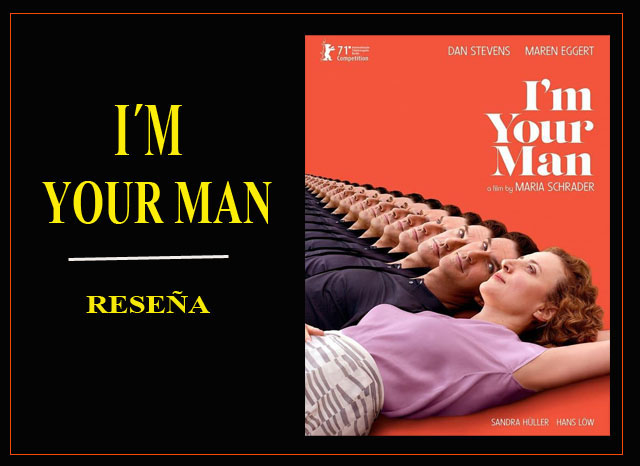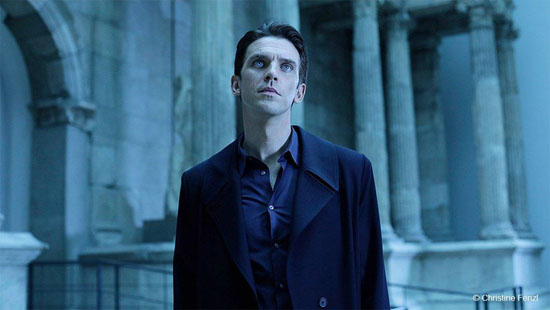
El elusivo tema de la felicidad sirve de excusa para que la directora alemana María Schrader nos deje en esta película I´m Your Man (2021), una interesante exploración sobre la complejidad de las relaciones humanas.
La película fue filmada en plena pandemia, con todas las restricciones que imponían las circunstancias del momento, lo que ha debido ser un gran reto debido a la cantidad de escenas en exteriores previstas en el guión.
La historia comienza cuando a la antropóloga Alma Felser (Maren Eggert) prácticamente la obligan a probar durante tres semanas a un robot-humanoide que ha sido diseñado especialmente para hacerla feliz y con posibilidades de convertirse incluso en su posible pareja.
Para Alma esta invitación no es nada atractiva, pero las autoridades del museo donde trabaja le hacen un pequeño chantaje, la convencen de lo conveniente que resulta aceptar el reto puesto que con ello el museo recibirá importantes recursos por parte de la compañía fabricante de este tipo de robots.
Las relaciones entre máquinas y humanos son un tema muy tratado en el cine, van desde acercamientos post apocalípticos como los presentados en la serie Terminator, hasta los que tienen que ver con el deseo de los robots de trascender su estado de máquinas, recuerdo en este momento las cintas “Yo robot” (2004), Blade Runner (1982-2017) e Inteligencia Artificial (2001).
En esta oportunidad se ha optado por hacer un retrato más intimista donde lo importante es profundizar en los grandes problemas existenciales de la humanidad.

Desde las primeras secuencias se nos muestra lo difícil que es aproximarse al ideal de felicidad de las personas.
El robot llamado Tom (Dan Stevens), el compañero de Alma, ha sido alimentado con toda la data necesaria para satisfacer las expectativas de la mujer promedio alemana. Sus algoritmos son construidos a partir de bases de datos con perfiles estadísticos de diferentes fuentes; se espera que con ello pueda predecir gustos, deseos y actuar de acuerdo a los diferentes imaginarios sociales de lo que es una vida ideal.
Cualquiera pensaría que la mayoría nos sentiríamos más cómodos estando con alguien que nos complazca, nos de la razón en todo y no nos cree conflictos… ¿Qué más se puede pedir en la vida…? Pero en los primeros intercambios entre Tom y Alma, se ve que necesariamente no es así. Es sabio aquel adagio popular que reza lo siguiente; “Bueno es cilantro pero no tanto”.
Tom es muy amable con Alma, le da la razón a cada momento, la alaba constantemente reforzándole los aspectos positivos de su personalidad, le organiza sus espacios de acuerdo al mayor orden posible.
Según los expertos al actuar de ese modo tendría que lograr hacer feliz a la mujer. Pero a ella estas cosas no le caen muy bien, la exasperan, no la satisfacen, lo siente falso. En el fondo todo aquello le parece muy teatral, le da la impresión de que “no es humano”.
Aquí cabría una pregunta: ¿Acaso para sentirnos bien con alguien y pensar en que podamos ser felices necesitamos una dosis de conflictos, desaires, y desconcierto…?
A Tom se le crea un gran problema, no sabe cómo actuar, no sabe muy bien qué hacer para complacer a Alma, para hacerla sentir bien y satisfecha. Y aunque muchas veces le pide que le diga cómo debe actuar, no hay forma de que encuentre eso que podemos llamar “el momento oportuno”: decir la palabra exacta en el momento adecuado, expresar la emoción más cónsona con la situación. En resumen, establecer empatía. Para Tom es casi imposible ponerse en el lugar de Alma.

A Tom, Alma le resulta indescifrable. El robot “siente” la misma incertidumbre que vivimos la mayoría de los humanos en nuestras relaciones personales. Si hay algo difícil es acertar en lo que puede hacer feliz al otro. Encontrar las claves que faciliten la convivencia humana puede ser una quimera.
Esas dificultades presentadas en la película para establecer relaciones son completamente reales, muestra de ello son los miles de libros de autoayuda que nos dicen cómo comunicarnos mejor o cómo ser más asertivos con los demás. Son millones las horas que invierten las personas en consultas de coaching, psicólogos o psiquiatras para aprender a establecer relaciones armónicas y satisfactorias, con los demás y consigo mismo.
A los humanos no se nos da fácil convivir con los otros, por eso para mucha gente puede ser muy tentadora la idea de tener una compañía como Tom...
Hay una escena donde Alma se encuentra con un hombre que también esta haciendo la prueba con una robot. Alma le pregunta cómo le va, y el hombre le responde que de maravilla, que nunca en su vida había conocido la felicidad y que gracias a esa compañera robot la está conociendo.
Este hombre siempre se había sentido marginado, no podía entablar relaciones con los demás y la robot le está brindando la compañía que nunca pudo conseguir con nadie. A él si le cae bien una máquina complaciente, dulce, dócil y eficiente. ¿Será que los hombres son de Marte y las mujeres de Venus, como señalaba aquella famosa obra de los noventa, donde su autor John Gray hablaba precisamente de la dificultad de las relaciones entre las personas…?
Alma en sus conclusiones finales sobre la experiencia vivida con Tom nos alerta sobre la posibilidad de incorporar una adicción más en nuestras vidas.
Tener como compañeros a robots complacientes, que no se enrollen, que no sean tóxicos ni inoportunos, es una tentación muy grande. Esa convivencia pudiera profundizar la dificultad de lidiar con las imperfecciones humanas, incrementando los problemas para relacionarnos y haciéndonos cada vez más solitarios.

La película me pareció muy bien lograda, las actuaciones de los protagonistas son memorables. Dan Stevens, en su papel de Tom trasmite muy bien la incertidumbre del humanoide al no encontrar la forma de poder cumplir el propósito de ser el compañero ideal. Maren Egger, por su parte, le da vida a un Alma que no duda en ningún momento sobre su preferencia por el género humano, con sus luces y sombras, con sus aciertos y desaciertos. Esta actriz tiene la capacidad de poder pasar convincentemente por muchos registros emocionales, logra meter al espectador en cualquiera de sus estados de ánimo, alegría, tristeza, incertidumbre o enojo.
Otro asunto que destaco en la película es la fotografía y la producción. Todas las tomas tanto de interiores como de exteriores están muy bien logradas, con la iluminación justa, los detalles adecuados y la paleta de colores apropiada para acompañar la emocionalidad de las escenas.
Si tienen la oportunidad denle un visionado a esta película, una muestra de las sorpresas que guarda el cine europeo, donde generalmente nos confrontamos con otras visiones de la vida. Se las recomiendo…
Gracias por tu tiempo.


The elusive theme of happiness serves as an excuse for German director Maria Schrader to leave us with an interesting exploration of the complexity of human relationships in this film I'm Your Man (2021).
The film was shot in the middle of the pandemic, with all the restrictions imposed by the circumstances of the moment, which must have been a great challenge due to the amount of outdoor scenes foreseen in the script.
The story begins when the anthropologist Alma Felser (Maren Eggert) is practically forced to test for three weeks a robot-humanoid that has been specially designed to make her happy and with the possibility of becoming her possible partner.
For Alma this invitation is not at all attractive, but the authorities of the museum where she works do a little blackmail, they convince her of how convenient it is to accept the challenge since with it the museum will receive important resources from the company that manufactures this type of robots.
The relationship between machines and humans is a subject that has been widely treated in cinema, ranging from post-apocalyptic approaches such as those presented in the Terminator series, to those that have to do with the desire of robots to transcend their state as machines, I remember at this time the films "I Robot" (2004), Blade Runner (1982-2017) and Artificial Intelligence (2001).
This time it has chosen to make a more intimate portrait where the important thing is to delve into the great existential problems of humanity.

From the first sequences we are shown how difficult it is to approach the ideal of happiness of people.
The robot named Tom (Dan Stevens), Alma's companion, has been fed with all the necessary data to satisfy the expectations of the average German woman. Its algorithms are built from databases with statistical profiles from different sources; it is expected to predict tastes, desires and act according to different social imaginaries of what an ideal life is.
Anyone would think that most of us would feel more comfortable being with someone who pleases us, agrees with us in everything and does not create conflicts... What more can you ask for in life...? But in the first exchanges between Tom and Alma, it is clear that this is not necessarily the case. It is wise that popular adage that goes as follows: "Good is coriander but not so good".
Tom is very kind to Alma, he agrees with her at every moment, he constantly praises her, reinforcing the positive aspects of her personality, he organizes her spaces in the most orderly way possible.
According to the experts, by acting in this way he should be able to make her happy. But she doesn't like these things, they exasperate her, they don't satisfy her, she feels it's false. Deep down it all seems very theatrical to her, it gives her the impression that it is "not human".
Here a question could be asked: in order to feel good with someone and to think that we can be happy, do we need a dose of conflicts, slights, and confusion?
Tom has a big problem, he doesn't know how to act, he doesn't know what to do to please Alma, to make her feel good and satisfied. And although he often asks her to tell him how to act, there is no way for him to find what we can call "the right moment": to say the right word at the right time, to express the emotion most in tune with the situation. In short, establishing empathy. It is almost impossible for Tom to put himself in Alma's shoes.

To Tom, Alma is indecipherable. The robot "feels" the same uncertainty that most of us humans experience in our personal relationships. If there is one thing that is difficult, it is getting right what can make the other person happy. Finding the keys that facilitate human coexistence can be a chimera.
Those difficulties presented in the film to establish relationships are completely real, proof of this are the thousands of self-help books that tell us how to communicate better or how to be more assertive with others. Millions of hours are invested by people in coaching, psychologists or psychiatrists to learn how to establish harmonious and satisfactory relationships with others and with themselves.
Humans do not find it easy to live with others, so for many people the idea of having a companion like Tom can be very tempting...
There is a scene where he meets Alma, a man who is also testing with a robot. Alma asks him how he is doing, and the man replies that he is doing wonderfully, that he had never known happiness in his life and that thanks to this robot companion he is getting to know it.
This man had always felt marginalized, he could not establish relationships with others and the robot is giving him the company he could never get with anyone. He does like an accommodating, sweet, docile and efficient machine. Could it be that men are from Mars and women from Venus, as pointed out in that famous work of the nineties, where its author John Gray spoke precisely of the difficulty of relationships between people...?
Alma in her final conclusions about her experience with Tom alerts us to the possibility of incorporating yet another addiction into our lives.
Having compliant robots as companions, who do not make out, who are not toxic or unwelcome, is a great temptation. This coexistence could deepen the difficulty of living with human imperfections, increasing the problems to relate to each other and making us more and more solitary.

I found this film very well done, the performances of the main characters are memorable. Dan Stevens, in his role as Tom, conveys very well the uncertainty of the humanoid not finding the way to fulfill the purpose of being the ideal companion. Maren Egger, for her part, gives life to a Alma who never doubts her preference for the human gender, with its lights and shadows, with its successes and failures. This actress has the ability to convincingly go through many emotional registers, she manages to put the viewer in any of her moods, joy, sadness, uncertainty or anger.
Another thing that stands out in the film is the photography and production. All the shots both indoors and outdoors are very well done, with the right lighting, the right details and the appropriate color palette to accompany the emotionality of the scenes.
If you have the opportunity, give this film a viewing, a sample of the surprises that European cinema holds, where we are generally confronted with other visions of life. I recommend it...
Thank you for your time.
Translated with www.DeepL.com/Translator (free version)







BÚSCALOS EN LOS SIGUIENTES ENLACES
https://wallet.hive.blog/~witnesses
https://peakd.com/me/witnesses
https://ecency.com/witnesses

HiveSigner or on Hive Witnesses.


Banner obsequio de los amigos de @rutablockchain


Comunidad Be Entrepreneur

You can vote for @ocd-witness, with


Banner obsequio de los amigos de @rutablockchain


Comunidad Be Entrepreneur

Muchas gracias por el apoyo.